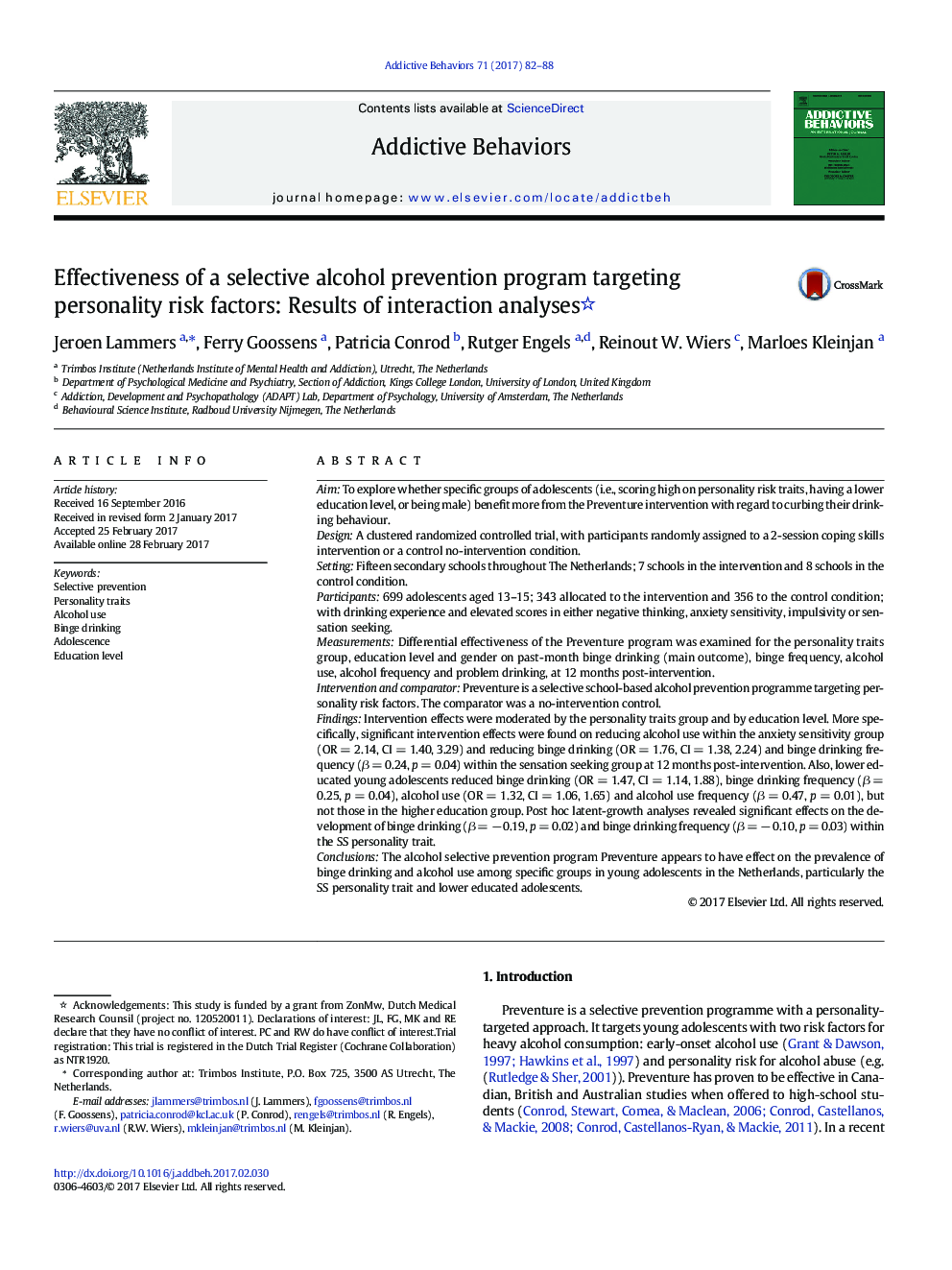| کد مقاله | کد نشریه | سال انتشار | مقاله انگلیسی | نسخه تمام متن |
|---|---|---|---|---|
| 5037795 | 1472500 | 2017 | 7 صفحه PDF | دانلود رایگان |
- Adolescents scoring high on sensation seeking benefit most from Preventure on binge drinking and binge drinking frequency.
- Adolescents scoring high on anxiety sensitivity benefit most from Preventure with regard to the outcome alcohol use.
- Lower educated adolescents benefit more from the Preventure programme than adolescents with higher level of education.
- The study provides indications that Preventure in the Dutch setting is promising, especially for schools with lower education.
AimTo explore whether specific groups of adolescents (i.e., scoring high on personality risk traits, having a lower education level, or being male) benefit more from the Preventure intervention with regard to curbing their drinking behaviour.DesignA clustered randomized controlled trial, with participants randomly assigned to a 2-session coping skills intervention or a control no-intervention condition.SettingFifteen secondary schools throughout The Netherlands; 7 schools in the intervention and 8 schools in the control condition.Participants699 adolescents aged 13-15; 343 allocated to the intervention and 356 to the control condition; with drinking experience and elevated scores in either negative thinking, anxiety sensitivity, impulsivity or sensation seeking.MeasurementsDifferential effectiveness of the Preventure program was examined for the personality traits group, education level and gender on past-month binge drinking (main outcome), binge frequency, alcohol use, alcohol frequency and problem drinking, at 12 months post-intervention.Intervention and comparatorPreventure is a selective school-based alcohol prevention programme targeting personality risk factors. The comparator was a no-intervention control.FindingsIntervention effects were moderated by the personality traits group and by education level. More specifically, significant intervention effects were found on reducing alcohol use within the anxiety sensitivity group (OR = 2.14, CI = 1.40, 3.29) and reducing binge drinking (OR = 1.76, CI = 1.38, 2.24) and binge drinking frequency (β = 0.24, p = 0.04) within the sensation seeking group at 12 months post-intervention. Also, lower educated young adolescents reduced binge drinking (OR = 1.47, CI = 1.14, 1.88), binge drinking frequency (β = 0.25, p = 0.04), alcohol use (OR = 1.32, CI = 1.06, 1.65) and alcohol use frequency (β = 0.47, p = 0.01), but not those in the higher education group. Post hoc latent-growth analyses revealed significant effects on the development of binge drinking (β = â 0.19, p = 0.02) and binge drinking frequency (β = â 0.10, p = 0.03) within the SS personality trait.ConclusionsThe alcohol selective prevention program Preventure appears to have effect on the prevalence of binge drinking and alcohol use among specific groups in young adolescents in the Netherlands, particularly the SS personality trait and lower educated adolescents.
Journal: Addictive Behaviors - Volume 71, August 2017, Pages 82-88
